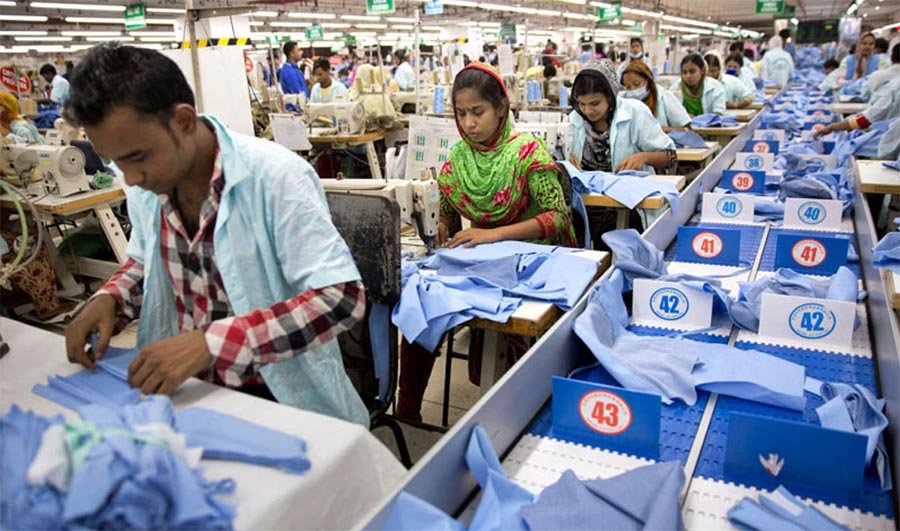Black_cats
ELITE MEMBER

- Joined
- Dec 31, 2010
- Messages
- 10,031
- Reaction score
- -5
US wants Bangladesh to take action against counterfeit apparel exports
The United States Trade Representative had identified Bangladesh as one of the top five sources for counterfeit clothing items globally, a discredit that stakeholders have identified as a matter of concern.The Daily Star
The United States Trade Representative identified Bangladesh as one of the top five sources for counterfeit clothing items globally, a discredit that stakeholders have identified as a matter of concern.
PHOTO: THE DAILY STAR
September 25, 2023
DHAKA – The United States has urged Bangladesh to take action to address the export of counterfeit clothing items from the second-largest garment supplier to the world’s largest economy.
The concerns were raised and discussed during the seventh round of the Trade and Investment Cooperation Forum Agreement (Ticfa) between Bangladesh and the US in Dhaka on September 20, according to a statement of the United States Trade Representative (USTR).
Earlier, the USTR identified Bangladesh as one of the top five sources for counterfeit clothing items globally, a discredit that stakeholders have identified as a matter of concern.
After the meeting, Senior Commerce Secretary Tapan Kanti Ghosh, who led the host side, told reporters that the visiting delegation requested Bangladesh to update the laws on intellectual property rights so that counterfeit goods are not exported to the US from the country.
The Bangladesh side said intellectual property rights are highly protected during trade. Still, if the affected American company lodges a complaint, the government will take necessary action, he said.
The statement also called for labour reforms, as well as reforms for the policies impacting the investment climate, digital trade, intellectual property protection and enforcement, and bilateral cooperation in the agricultural sector.The concerns were raised and discussed during the Ticfa meeting between Bangladesh and the US in Dhaka on September 20
The US conveyed to Bangladesh that supporting workers’ rights, including freedom of association and collective bargaining, is a top priority for the Biden-Harris administration.
The US emphasised the importance of combatting violence against workers and union organisers, as well as anti-union discrimination and other unfair labour practices.
The statement noted the ongoing review of potential amendments to the Bangladesh Labour Act and encouraged Bangladesh to extend freedom of association and collective bargaining to economic zones and export processing zones.
The US also recognised that Bangladesh had undertaken some steps to address hurdles workers face when registering unions and stressed the importance of ensuring a simplified and impartial trade union registration process that allows applications to be registered within the legal timeframe.
Additionally, the US urged Bangladesh to dedicate more resources to labour inspections and enforcement.
The statement appreciated the government of Bangladesh’s consistent dialogue over the past year on the development of the Data Protection Act (DPA).
Both sides affirmed their commitment to the protection of personal data and ensuring that Bangladesh’s digital sector continues to thrive.
The US welcomed the latest draft of the DPA, which incorporated improvements from earlier versions, including the removal of criminal penalties, restricting the scope of the DPA to personal data, and limiting application to firms that process personal data within the territory of Bangladesh.
It applauded Bangladesh’s actions aimed at removing the long-standing cotton fumigation requirement for American cotton exports and for revising the seed law to reduce the number of years a company needs to hold a seed dealer licence.
The US and Bangladesh cooperated on agricultural biotechnology dialogue and look forward to deepening their engagement this year, the statement said.
Both countries recognised the importance of the protection and enforcement of intellectual property (IP) to protect innovation across economies.
The US also reiterated its interest in engaging with Bangladesh on the ongoing processes for amendments to IP-related laws and regulations, including the Copyright Act Amendments, the Industrial Designs Act, the Patent Bill, and implementing regulations and IPR enforcement (import and export) rules.
The next Ticfa Council meeting will take place in Washington DC in 2024.

US wants Bangladesh to take action against counterfeit apparel exports
The United States Trade Representative had identified Bangladesh as one of the top five sources for counterfeit clothing items globally, a discredit that stakeholders have identified as a matter of concern.


